The ultimate guide to anti-corrosion protection
Corrosion is the gradual destruction of materials, usually metals, by chemical and/or electrochemical reaction with their environment. It's a pervasive issue that affects a wide range of industries, leading to significant economic losses, safety hazards, and environmental concerns. Understanding the mechanisms of corrosion is essential for developing effective protection strategies.
Implementing anti-corrosion measures is crucial for extending the lifespan of metal structures and components, ensuring safety, and reducing maintenance costs. For industries that operate in harsh environments or with critical infrastructure, the stakes are even higher, making anti-corrosion protection a top priority.
Types of Corrosion Protection
Barrier coatings are applied to the surface of metals to prevent exposure to corrosive elements. These coatings can be made from various materials, including paints, plastics, and rubber, forming a protective layer that shields the metal from moisture, chemicals, and other corrosive agents.
Sacrificial coatings, such as galvanizing, involve coating the metal with a more reactive metal that will corrode in place of the protected metal. This method is commonly used for steel structures and provides long-term protection.
Corrosion inhibitors are chemicals that, when added to a corrosive environment, decrease the corrosion rate. They can be used in various applications, from cooling systems to concrete reinforcement.
Cathodic protection is an electrochemical process that reduces the corrosion rate of a metal surface by making it the cathode of an electrochemical cell. It is often used in conjunction with coatings for pipelines, ships, and offshore platforms.
Anti-Corrosion Materials and Technologies
Developing alloys with high resistance to corrosion is a key strategy in combating corrosion. Stainless steel, for example, contains chromium that forms a passive film of chromium oxide, preventing further surface corrosion.
Advancements in coating technologies, such as powder coatings, thermal spray coatings, and nano-coatings, offer superior protection against corrosion. These technologies provide a more uniform and durable layer of protection compared to traditional methods.
Modern corrosion inhibitors and additives are designed to be more environmentally friendly and efficient. They are used in various settings, from industrial processes to automotive coolants, to protect against corrosion.
Application Methods for Anti-Corrosion Coatings
Brushing and rolling are traditional methods of applying coatings that are suitable for small areas and touch-up work. They require minimal equipment and can be performed with precision.
Spraying is a common application method for larger surfaces. It provides a quick and even application but requires specialized equipment and safety measures to prevent inhalation of aerosols.
Dipping involves immersing the metal component in a bath of coating material. This method ensures complete coverage and is ideal for complex shapes and high-volume production.
Maintenance and Inspection
Establishing regular maintenance schedules is essential for the longevity of anti-corrosion protection. Routine checks and touch-ups can prevent minor issues from escalating into major problems.
Various inspection techniques, such as visual inspection, ultrasonic testing, and electromagnetic methods, are used to assess the integrity of coatings and the extent of corrosion.
When corrosion is detected, prompt repair and rehabilitation are necessary to restore protection. This may involve removing the corroded material, applying new coatings, or replacing parts.
Industry-Specific Anti-Corrosion Strategies
In the construction and infrastructure sector, anti-corrosion protection is vital for the longevity of buildings, bridges, and public utilities. Using the right materials and coatings can prevent structural failures and costly repairs.
The marine industry faces unique challenges due to constant exposure to saltwater. Specialized coatings and materials are required to protect ships, offshore structures, and port facilities from corrosion.
The automotive and transportation industries rely on anti-corrosion measures to ensure vehicle longevity and safety. From body coatings to underbody protection, various solutions are employed to combat rust and corrosion.
In the oil and gas industry, corrosion can lead to catastrophic failures and environmental disasters. Robust anti-corrosion systems are critical for pipelines, storage tanks, and drilling equipment.





Comments (0)